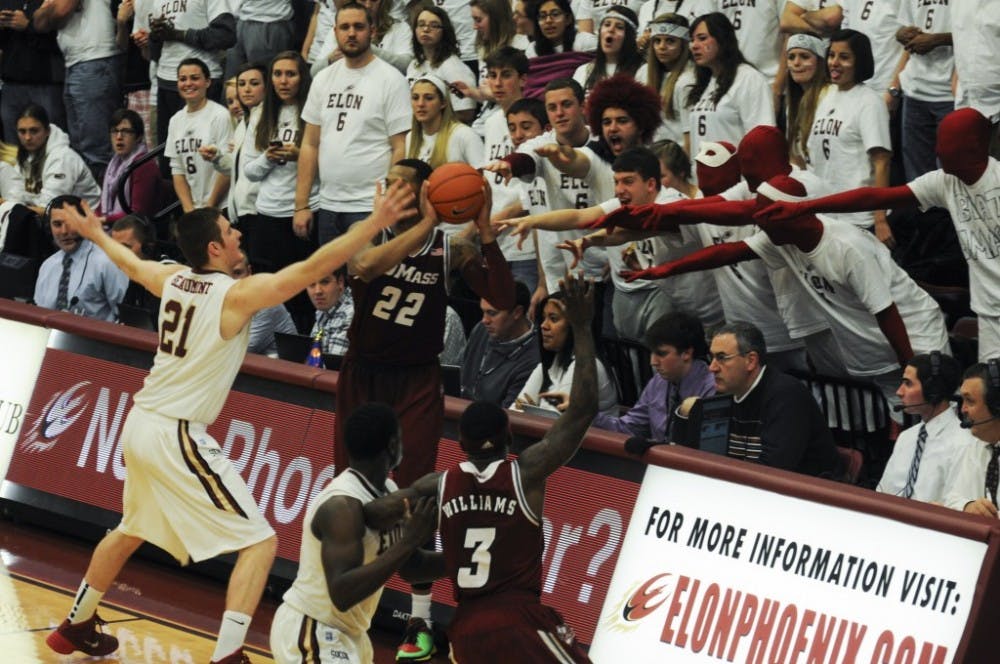Elon University football head coach Rich Skrosky’s Twitter page often uses the phrase “embrace the grind.” This is a truly fitting mantra, not only for Elon football, but for the entire university. Success will not come overnight, just like national recognition did not happen in a day. Each of us that makes up the Elon community must be ready to “embrace the grind” if we want to see our university attain the status of a top-tier, nationally recognized school.
Athletics holds the key to attaining national recognition for many universities. Gonzaga University, George Mason University and Butler University have all seen dramatic increases in applications, alumni donations, school spirit and overall revenue because of athletic success. As Elon’s athletic teams move into the Colonial Athletic Association, the university is poised to become a well-rounded institution that could benefit greatly from athletic success.
Prior to the 1999 basketball season, Gonzaga was a relatively unknown school. During the 1997-98 fiscal year, Gonzaga received $9.7 million in gift donations. In 1999, the Gonzaga men’s basketball team reached the regional finals of the NCAA tournament. Not only were they winning games, they were also receiving hours of televised exposure for their school. Since that season, Gonzaga basketball has made several appearances in the NCAA tournament. Two years later, in the 2000-01 fiscal year, the school received $16.5 million in gift donations.
The “Southern Economic Journal” recently investigated the legitimacy of athletic success and the repercussions it has on the amount of applications a university receives. The study found when it comes to basketball, any school that makes the 65-team bracket could expect to see a 1–3 percent boost in applications the following year. If a school makes it to the Sweet 16, they will see a 3-5 percent boost in applications and, if a school reaches the championship game, they will see a 7-8 percent boost in applications.
During the 2010 and 2011 seasons, when Butler’s men’s basketball team made back-to-back appearances in the NCAA tournament championship game, the school was estimated to have received $1.2 billion dollars worth of exposure from print, TV, radio and merchandise sales. Additionally, applications rose by 41 percent after the 2010 appearance.
These sudden and drastic amounts of exposure seen by schools like Butler and Gonzaga are unique to athletic success. A school would have to spend millions of dollars to attain the same amount of publicity generated from a deep playoff run in any major sport such as football or basketball. The swelling of pride and uptick in alumni donations after national sports exposure is a benefit that would be difficult to duplicate by any other means.
A common complaint about Elon is there is a lack of school spirit. That may be true, but for those of who attended the men’s soccer game against Clemson University or the men’s basketball game against the University of Massachusetts, it is hard to say that the student body does not enjoy watching our athletic teams compete against the nation’s best.
It does not take a lot to spark school spirit and some of the results are surprising. When George Mason University defeated the University of North Carolina at Chapel Hill and the University of Connecticut on its way to the Final Four of the NCAA basketball tournament, the bookstore sold $876,000 worth of merchandise over a 10-day span. Normally, the bookstore posted $45,000 worth of sales a month.
Behind every successful university is a strong athletic department. To become a top-tier school, a university must have success across the board. Elon now finds itself in prime position to grow substantially over the next few years.
Over the course of its 125-year history, Elon’s communication and business schools have achieved national recognition. Our campus is continuously ranked as one of the most beautiful college campuses in the country. Elon’s study abroad and theater programs are repeatedly ranked among the nation’s best. The only true missing piece of the puzzle is continued athletic success.
It is often mistakenly believed that athletic and academic success are not able to coexist. Many feel as though athletic success somehow diminishes the value of an institution or that academic success means a school’s athletics are not taken seriously. This is simply not true. The reality is that the two disciplines often compliment each other. Princeton University has a long history of national success in basketball Stanford has fielded top-ranked teams, and so have many top-ranked universities. Duke University, right down the road from from Elon, is a powerhouse in basketball and academics. Duke’s soaring climb in the national rankings illustrates the importance of the academic and athletic balance.
When a university’s athletic teams are enjoying success, the exposure that the school receives from that success attracts students and faculty from across the country. Similarly, when a school boasts successful academics, athletes want to be a part of that environment and strive to mirror that academic excellence in their athletic endeavors. Whether it is fair or right, money and recognition follow athletic success for a university.
As we enter a more academically and athletically prestigious conference, Elon has a perfect opportunity to attain national recognition. After years of growing its academic programs, Elon is poised to enter the next chapter: national athletic recognition.
While Elon’s academic strength continues to push us closer to being a top-tier school, the university’s athletic teams should strive to match that success. With those two disciplines complementing each other, Elon will leap ahead of its CAA counterparts and enter the lexicon of national universities excelling in both academics and athletics. It is a worthy goal for the university to achieve.
Members of the Editorial Board are Nick Foley, Jonathan Black, Katy Canada, Greg Honan and Lauren Phillips.


